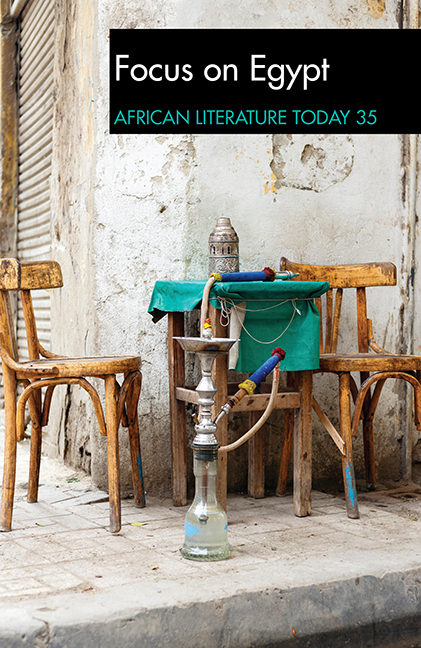Book contents
- Frontmatter
- Dedication
- Contents
- Notes on Contributors
- Foreword
- EDITORIAL ARTICLE
- ARTICLES
- Coping with a Failed Revolution: Basma Abdel Aziz, Nael Eltoukhy, Mohammed Rabie & Yasmine El Rashidi
- The Complications of Reading Egypt as Africa: Translation & Magdy el-Shafee's مترو (Metro)
- Narratives of the ‘Nubian Awakening’: Reclaiming Egypt's African Identity
- Frantz Fanon's Conceptualization of Decolonization in Sonallah Ibrahim's The Committee
- Romance as Epistemological Aesthetic in the Fiction of Ahdaf Soueif
- Literature as Prophecy: Re-Reading Yusuf Idris's The Cheapest Nights
- Travel & Discovery: Hopes for a New Egypt in Mohamed Salmawy's Butterfly Wings
- The Symbolic Relevance of the Use of the Eye in Nawal El Saadawi's Two Women in One & God Dies by the Nile
- African Epics: A Comparative Study of Sundiata & Al-Sirah al-Hilaliyyah
- Conversations with Nawal El Saadawi: Online interview
- FEATURED ARTICLES
- LITERARY SUPPLEMENT
- TRIBUTE
- REVIEWS
- Reviews of Nigerian Poetry
Frantz Fanon's Conceptualization of Decolonization inSonallah Ibrahim's TheCommittee
from ARTICLES
Published online by Cambridge University Press: 24 August 2019
- Frontmatter
- Dedication
- Contents
- Notes on Contributors
- Foreword
- EDITORIAL ARTICLE
- ARTICLES
- Coping with a Failed Revolution: Basma Abdel Aziz, Nael Eltoukhy, Mohammed Rabie & Yasmine El Rashidi
- The Complications of Reading Egypt as Africa: Translation & Magdy el-Shafee's مترو (Metro)
- Narratives of the ‘Nubian Awakening’: Reclaiming Egypt's African Identity
- Frantz Fanon's Conceptualization of Decolonization in Sonallah Ibrahim's The Committee
- Romance as Epistemological Aesthetic in the Fiction of Ahdaf Soueif
- Literature as Prophecy: Re-Reading Yusuf Idris's The Cheapest Nights
- Travel & Discovery: Hopes for a New Egypt in Mohamed Salmawy's Butterfly Wings
- The Symbolic Relevance of the Use of the Eye in Nawal El Saadawi's Two Women in One & God Dies by the Nile
- African Epics: A Comparative Study of Sundiata & Al-Sirah al-Hilaliyyah
- Conversations with Nawal El Saadawi: Online interview
- FEATURED ARTICLES
- LITERARY SUPPLEMENT
- TRIBUTE
- REVIEWS
- Reviews of Nigerian Poetry
Summary
In his OctoberPaper of 1974, Egyptian president Anwar Sadat announcedInfitah, an open door economic policyaimed at encouraging foreign investments in Egypt's privatesector. ‘Codified in Law 43/1974, Infitahstripped away state intervention, provided major taxexemptions for foreign companies, and lifted the requirementthat foreign companies be partly Egyptian-owned’ (Brownlee‘Peace Before Freedom’: 649). Infitah endedup enriching the bourgeoisie and the foreign companies whomade investments in Egypt. The populace, however, were notso fortunate: ‘Infitah had unleashed“consumption liberalization” without alleviating the strainon Egyptian families’ (Brownlee: 650). The cost of livingrose by 20 per cent, crime rates skyrocketed, along withunemployment, and other forms of maladies.
Following theoutcome of Infitah, Egypt's intellectualsbegan to view the foreign exploitation of their country as anew form of colonialization. With the arrival of the foreigncompanies came not only economic exploitation, but culturalinfiltration by the West. It was a painful reminder of themid-1960s when Coca-Cola and other American multinationalcompanies in Egypt ‘played an integral role in buttressingIsraeli militarism, Zionist settler colonialism, and Westernimperialism’ (Labelle ‘De- Coca-Colonizing Egypt’: 124). Theintellectuals viewed this new combination of economic,cultural and political manipulation of Egypt as a majorthreat to their country's prosperity. Together with theEgyptian masses, they began to campaign againstInfitah and the overall permissivenessof their country's leaders with the Western politicians andbusinessmen. In January 1975, thousands protested on thestreets of Cairo, and in March of that same year, 40,000workers in the town of Mahalla went on strike. In January1977, thousands rioted in cities throughout Egypt, leavingeighty people killed, and hundreds wounded. Manyintellectuals who galvanized the masses suffered frequentraids and imprisonments by the regime.
This historicalmoment in Egypt is the focus of Sonallah Ibrahim'sThe Committee (1981). Ibrahim, one ofEgypt's most influential novelists, had been imprisoned in1959 for alleged communist ties. He spent five years out ofa seven-year sentence behind bars and was released in 1964.My discussion of Ibrahim's The Committeesuggests that Ibrahim's novel is shot through with motifsfrom Frantz Fanon's The Wretched of theEarth (1961), and that its narrativeallegorically presents several major components of Fanon'sdecolonization structure.
- Type
- Chapter
- Information
- ALT 35: Focus on EgyptAfrican Literature Today 35, pp. 58 - 71Publisher: Boydell & BrewerPrint publication year: 2017

